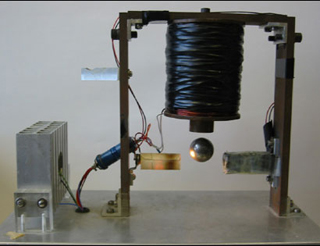Course Description
This course provides an introduction to the design of feedback systems. Topics covered include: properties and advantages of feedback systems, time-domain and frequency-domain performance measures, stability and degree of stability, root locus method, Nyquist criterion, frequency-domain design, compensation techniques, …
This course provides an introduction to the design of feedback systems. Topics covered include: properties and advantages of feedback systems, time-domain and frequency-domain performance measures, stability and degree of stability, root locus method, Nyquist criterion, frequency-domain design, compensation techniques, application to a wide variety of physical systems, internal and external compensation of operational amplifiers, modeling and compensation of power converter systems, and phase lock loops.
Course Info
Learning Resource Types
grading
Exams
assignment
Problem Sets

Magnetic levitation, demonstrated in this photograph, is the topic of one of the design project options. (Image courtesy of Dr. Kent Lundberg.)










